CCTX-351: Continental Divide Mountaineering & Rock Climbing
Course Code: CCTX-351
Start Date: 6/10/23
End Date: 7/1/23
This course will take you through the highest terrain in Colorado! The Continental Divide marks the decision point for water as it either flows down to the east toward the Gulf of Mexico, or it flows down to the west to the Pacific. On this course you’ll travel along this “backbone of America.” Unlike mountain runoff (which only flows down), you’ll be working your way higher using mountaineering techniques such as fixed lines, climbing and scrambling, and utilizing ice axes or crampons. Far away from civilization, you’ll find how close you can get to others as you work as a team on this expedition.
Leadville Mountain Center, Colorado
Colorado Outward Bound’s 600-acre property at the base of Mount Massive. Our base camp encompasses mountain streams, wild plants, fields and forests. Lake Fork Creek (that runs into the headwaters of the Arkansas River) runs near the east of our property and the Colorado Trail borders us to the west. If the timing is right, colorful wildflowers will brighten the trails through the LMC. You might share camp with elk, deer, chipmunks and myriad other wildlife. This region is within the ancestral lands of the Núu-agha-tʉvʉ-pʉ̱ (Ute) nation.
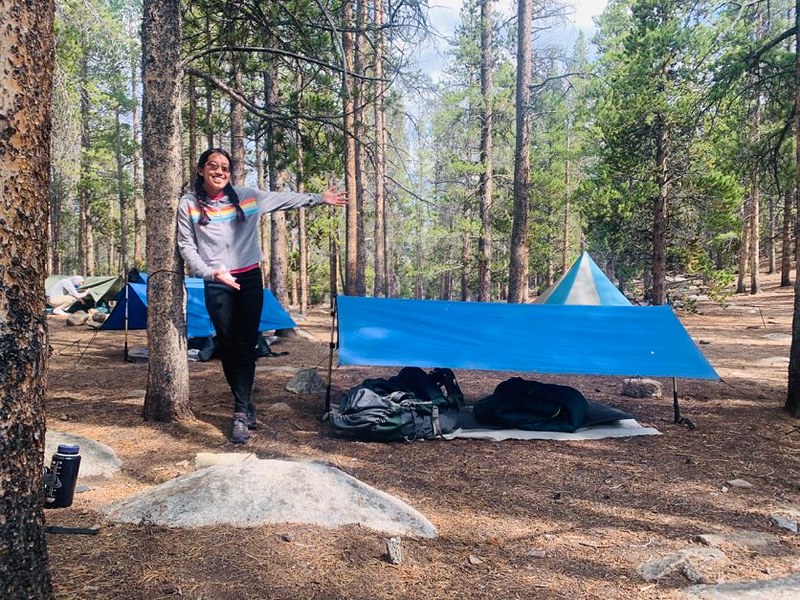
📍Núu-agha-tʉvʉ-pʉ̱ (Ute) lands
The Sangre de Cristo Mountains, Colorado
The Sangre de Cristo Mountains are the southernmost subrange of the Rocky Mountains. The region is designated a Dark Sky Range, making it a great destination for spotting shooting stars and the Milky Way. The Sangre de Cristos and the neighboring San Luis Valley are home to a rich cultural history at the intersection of Latinx, Native American and African American heritage. As such the region was designated a National Heritage Area. Sangres contain several wilderness areas and are known for several geologic wonders including the Crestone Needle and Great Sand Dunes National Park. The Sangre de Cristo mountain range lies within the ancestral lands of the Ute, Tséstho’e (Cheyenne), and Jicarilla Apache nations.
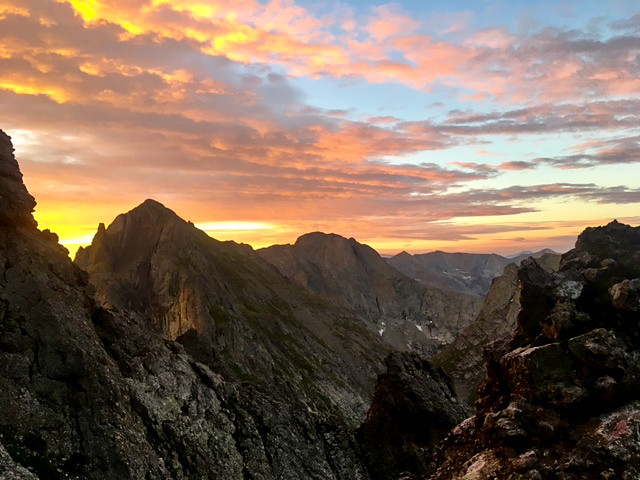
Photo: Izzy Lazarus |📍Ute, Tséstho’e (Cheyenne), and Jicarilla Apache lands
Rocky Mountains, CO
The Colorado Rockies is home to the most high peaks in the lower 48 states, with hundreds of iconic mountains standing over 13,000 and 14,000 feet tall. The region is characterized by dense pine forests and rocky alpine ecosystems. Students will enjoy clear blue glacial lakes, fields of wildflowers, waterfalls, and striking rock formations. If they are observant, students may spot wildlife like elk, mountain goats, moose, marmots, pikas and eagles. These regions are within the ancestral lands of of the Núu-agha-tʉvʉ-pʉ̱ (Ute), Cheyenne, Arapaho, Očeti Šakówiŋ (Sioux), Eastern Shoshone, Jicarilla Apache, and Pueblos nations.
What is a land acknowledgment?
At the Colorado Outward Bound School, we include land acknowledgments in our work as a formal way to recognize and respect the traditional territories and Indigenous Peoples as stewards of the land. It is important to understand and acknowledge the comprehensive past, present, and future of the places we travel and to seek to understand our role therein. To recognize the land is an expression of gratitude and appreciation we give to the Indigenous Peoples who have been living and working on the land from time immemorial. Read more about land acknowledgments at Outward Bound here.
Turtle Rock
Nestled in the Arkansas Valley, Turtle Rock provides the perfect venue for learning the basics of rock climbing. With sweeping vistas of the Collegiate Range to the west, students will climb and rappel on weathered granite domes while camping among the pinon pines and sage brush, in this high alpine desert environment. The Turtle Rock Campground provides a great introduction to camping, while still allowing for some frontcountry amenities like pit toilets and potable water. These regions are within the ancestral lands of the Núu-agha-tʉvʉ-pʉ̱ (Ute) nation.
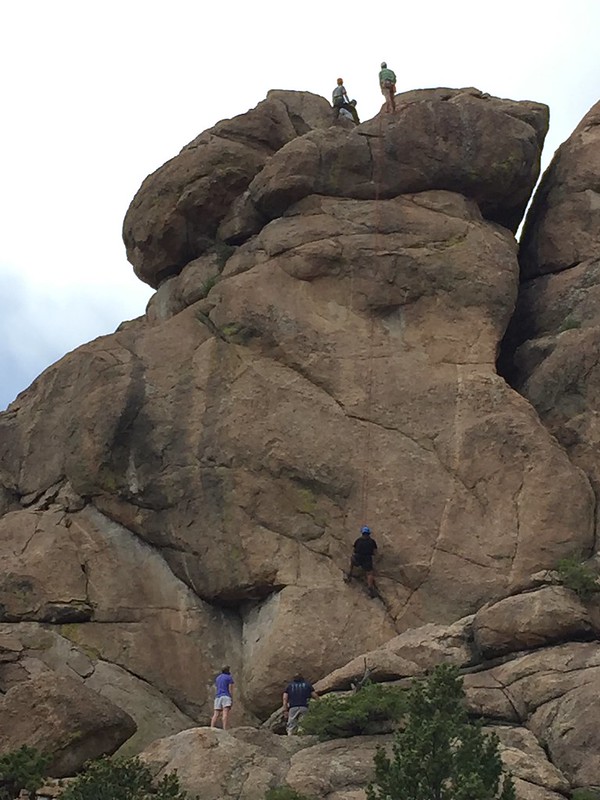
Photo: Bethany Frakes |📍Núu-agha-tʉvʉ-pʉ̱ (Ute) lands
Alpine Backpacking
Alpine Backpacking will develop a foundational outdoor skillset for students allowing comfortable living during course. Traveling mostly above treeline, students will carry everything they need - food, shelter, clothing and gear – allowing them to go deep into the mountains where few people can reach. Backpacking provides a sense of freedom, allowing students to eat when hungry, set up camp when tired, and exercise complete control over what is accomplished each day. The simplicity of backpacking gives students the opportunity to focus both internally on their own thoughts, as well as externally to connect deeply with others as they talk, sing, play games and spend time together without distraction. With the Rocky Mountains as a backdrop, students are introduced to backpacking with lessons in basic travel and camping techniques. As this section progresses, students learn Leave No Trace techniques, map and compass navigation, camp craft, and obtain an understanding of the area’s human and natural history.
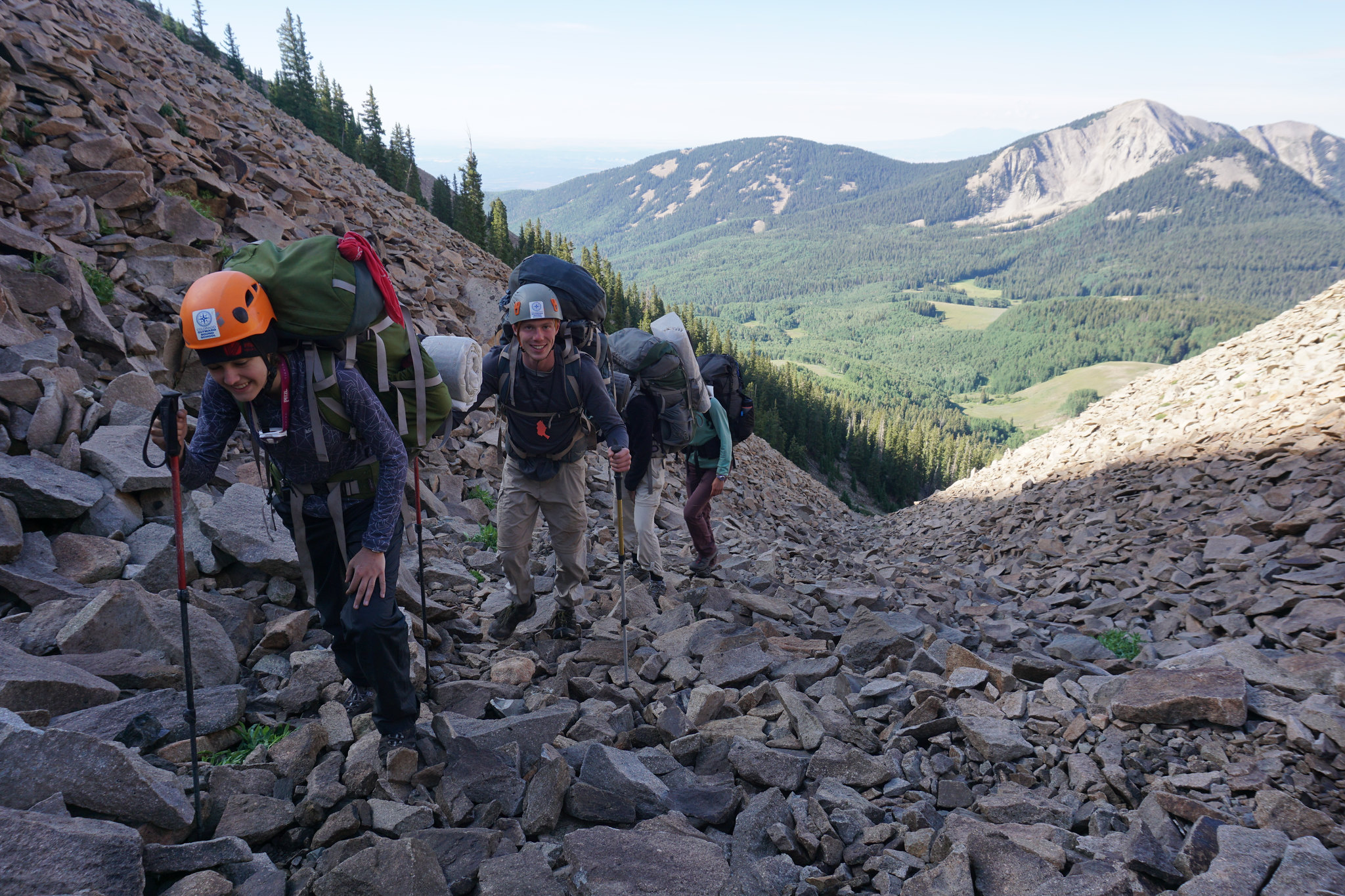
Photo: Dave Erbe |📍Núu-agha-tʉvʉ-pʉ̱ (Ute) lands
Mountaineering
If you are excited to take on an adventure slightly more challenging than alpine backpacking - mountaineering is for you! Mountaineering can be simply understood as a more technical form of hiking that grants students access to some of the most beautiful mountains. Instructors will teach students how to use tools like ice axes and ropes to travel over dirt, snow, ice, and rocks in the mountains. Many mountaineering courses will include attempting to summit a mountain, which involves exposure to heights and technical terrain. These expeditions can last for several hours, but the rewards at the top of the mountain are worth the effort.
You do not need to be an all-star athlete to excel at mountaineering. Enthusiasm for learning technical outdoor skills and spending long days in the mountains are the most important things to bring to course.
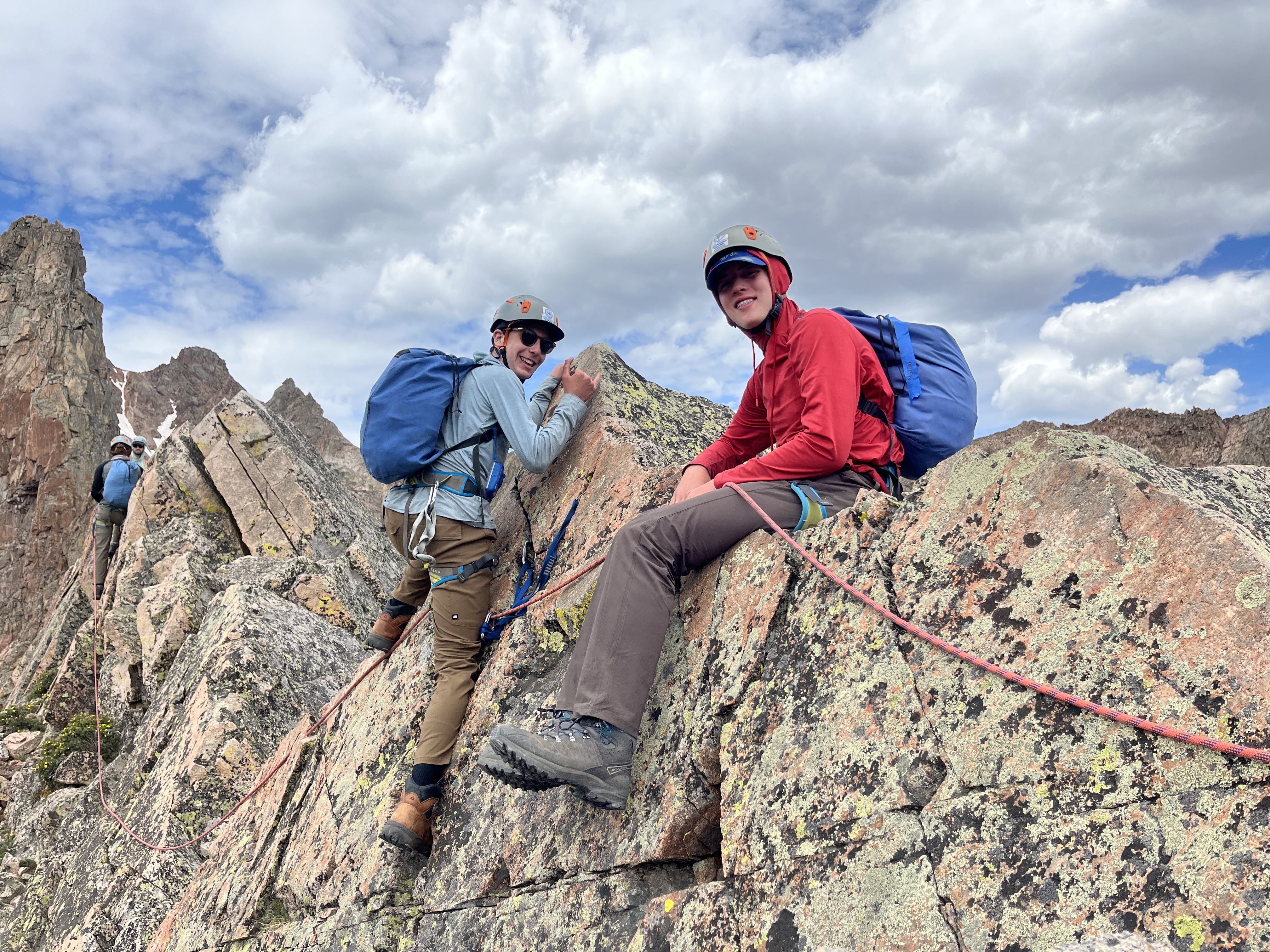
📍Ute lands
Rock Climbing
Outdoor rock climbing can be both mediative and thrilling, making it a highly rewarding sport mentally and physically. It’s a great opportunity to connect with others in the outdoors while also developing confidence in your body. Students will learn new body mechanics, balance, and climbing techniques. Instructors will help students set personal goals as they navigate the rock wall. They will get to experience the incredible feeling of accomplishing a route and pausing at the top to enjoy the views from above the trees. There are many ways to climb the same rock, allowing each climber to solve the puzzle in their own way.
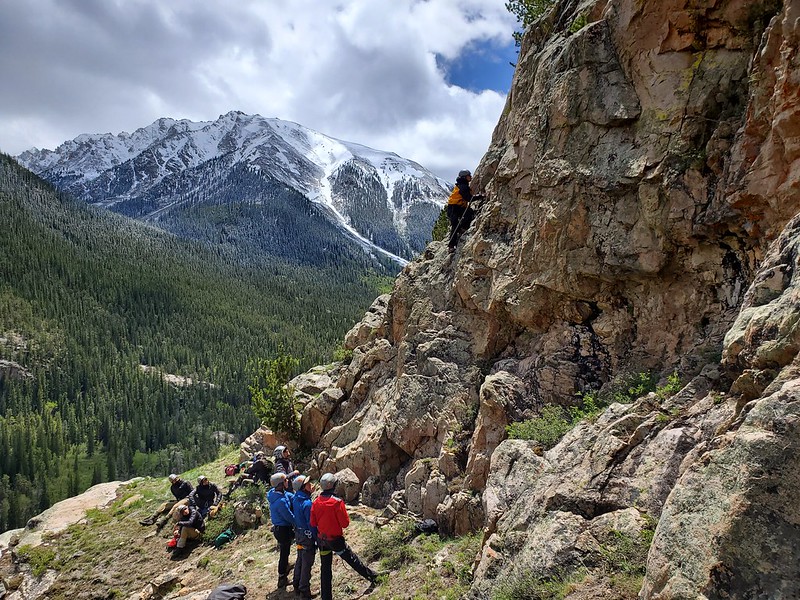
Photo: Joe Kubis |📍Núu-agha-tʉvʉ-pʉ̱ (Ute) lands
Guided Reflection and Transference
At Outward Bound we believe there is no learning without reflection. Throughout course, you will be prompted to reflect on what you’re experiencing on course, and what it means in the greater context of your life. Sometimes this is a journaling exercise, sometimes a group sharing experience, and sometimes a moment of solitude to sit and think. You spend focused time toward course progression end exploring how your new knowledge, skills and attributes can apply to your life after course.
Solo
Solo is a time when you’ll get the opportunity to spend time alone during course. With sufficient food and equipment, your Solo will be a chance to reflect on your course experience, journal, and connect with nature. Depending on your course length and environmental factors, Solo can range from 30 minutes to an overnight experience. You will not travel during this time and your Instructors may check on you occasionally. Your solo site will be close enough to your Instructors in case of emergency, but far enough removed to enjoy solitude. Many students are initially nervous about solo, but later recall it as one of the highlights of their course.
Peak Attempt
Peak Attempts present an opportunity for challenge, teamwork, and the need to pull together all of your learned skills for success. Your expedition will include at least one peak attempt. Peak attempts are major enterprises and typically require early morning starts and can take all day to complete. Weather, or other factors including group dynamics and physical readiness, may preclude even an attempt to ascend a peak.
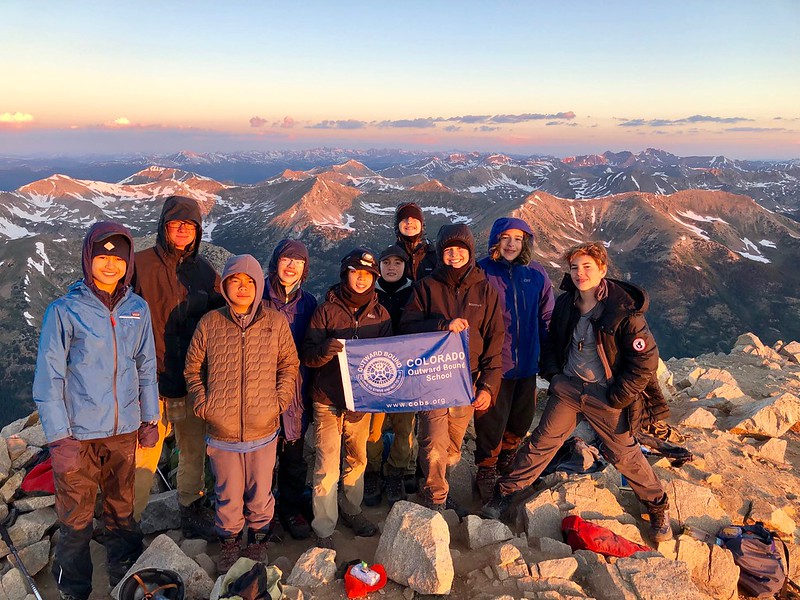
Photo: Naomi Winard |📍Núu-agha-tʉvʉ-pʉ̱ (Ute) lands
Challenge Event
A Challenge Event may occur at the end of a student's course experience. These are opportunities to test the perseverance, endurance, and grit that you've developed on course. A challenge event might be individual, like long run or peak attempt. Your event might be a group focused challenge, including long final travel days or group challenges that require all of the skills and teamwork your groups has learned. The purpose of a challenge event is to help students realize the extent of their growth, physically, mentally, and emotionally, and to take home these learnings in an unforgettable way.
Service
Service is a pillar of the Outward Bound experience. On each course, students learn to practice intentional service to themselves, to others and to the environment. This may look like practicing self-care or supporting a crewmate who is having a hard day. Participants also learn to Leave No Trace ethics, practicing service to the environment by preserving and respecting the fragile ecosystems they encounter. Students experience firsthand the social and emotional benefits of acts of service. They are encouraged to bring this ethic of care to their life back home.
Sample Itinerary
The following is an example of what your itinerary may look like. Your actual course plan will vary according to weather, your group’s skills and abilities, and Instructor preferences.
Day 1: Course Start
Inspect and issue gear
Meet Instructors and peers
Days 2-8: Backpacking and Rock Climbing
Curriculum includes:
Basic map and compass navigation
Time management
Basic first aid
Rock climbing techniques
Group decision making
Summit strategies
Basic campcraft
Backcountry living
Peer leadership
Outward Bound philosophy
Days 9-17: Mountaineering and Rock Climbing
Curriculum includes:
Advanced top rope rock climbing skills
Belaying
Rappelling
Fixed line techniques
Technical peak attempts
Reflection (2 or 3-day solo)
Advanced navigation
Advanced group communication
Advanced decision making
Advanced peer leadership
Conflict resolution
Days 18-21: Final Expedition
Independent Group Travel
Independent group communication, decision making, peer leadership
Day 21: Challenge Event and Course End
Culminating Challenge (Group or individual)
Day 22: Transportation home
Our expeditions help students grow into the best version of themselves. We use adventure in the outdoors to help students discover their strengths and build authentic connections with their peers. Compassion for oneself and others is foundational to the Outward Bound experience. As students develop outdoor skills, they also gain confidence and leadership tools that will last a lifetime. Course outcomes include:
- Belonging – students form deep connections founded upon respect, inclusion, and compassion
- Reflection – students learn self-awareness and practice empathy towards others
- Physical Engagement – students develop awareness and confidence in their bodies
- Courage – students develop the confidence to speak up for themselves and persevere through challenges
Watch to Learn More
Tuition
You can pay your tuition online through your Applicant Portal or make the payment over the phone by calling 720-381-6589.
If your payment is not received by the due date listed in your Enrollment Email and on your Applicant Portal, you will risk losing your spot on course and your $500 deposit. Please review our Admissions and Cancellation Policies.
Travel Insurance
Airfare, travel costs, and non-refundable tuition payments are expensive. Insurance to protect your trip and course is strongly encouraged. We recommend insuring these costs from the third-party provider InsureMyTrip. This provider has coverage options that include travel costs and non-refundable tuition costs. For more information and to receive a free quote, click here.
Click here for COBS COVID-19 Program Practices